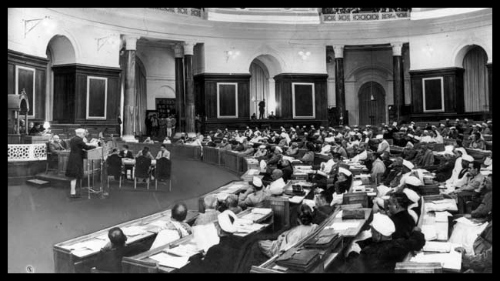The following comments were made by a reader, Mr. R Nanjappa on a speech by C Rajagopalachari (The Keystone of the Constitution, 1971) from the Indian Liberal archives, which we had republished some time back.
The Indian Constitution is a product of learned labour, and not inspiration and native wisdom. Its authors borrowed from everywhere, but did not digest properly and so failed to reconcile things- eg. as between the powers of the President and the Prime Minister, so that almost from the beginning, the President has been reduced to a rubber stamp.
The Indian Constitution does not stand on or recognise any moral authority, such as the US Constitution does. The Declaration of Independence clearly sets the moral standards and tone of the constitution there, but the Indian has nothing similar. When Abraham Lincoln spoke “fourscore years and seven” later, he recalled this in his Gettysburg address. And a “five score” years further on, Martin Luther King recalled it, standing under the shadow of Lincoln’s statue. And what were they both referring to? It were these words:
“We hold these truths to be self-evident, that all men are created equal, that they are endowed by their Creator with certain unalienable Rights, that among these are Life, Liberty and the pursuit of Happiness.”
Writers like Marianne Williamson have written about the “spiritual” quality of the US Constitution! Now, we don’t have such a noble sentiment to guide us. In the circumstances, “Fundamental Rights” are what we have- the keystone, as Rajaji called it.
They are fundamental, NOT because the Constitution says so; the Constitution says so because they are fundamental! The constitution merely recognised what had long existed by custom and tradition – by God given law or dharma in this land.These are natural “unalienable” rights of people in any civilised society, to defend which govts. are needed!
As constitutional writers and thinkers like A.V.Dicey, K.C.Wheare, Harold Laski, etc have pointed out, a Constitution but reflects the spirit or the conditions of the times. Nehru was part of that spirit and time, but did not keet it- the 17th Amendment (1) was passed in his time.. Indira was a stranger to democratic conventions and ideals, and had no respect for freedom. Her successors have been worse.
Even most educated Indians do not understand the difference between the Constitution and other legislation.The Constitution is not one more law. There are provisions for amending both, but the underlying spirit is not the same. It is not a matter of having the required majority.Those who understood, and therefore tried to defend the keystone of the Constitution have been few in this land. Now, after Palkhivala, we do not have any one eminent person to defend the Constitution. Even our Judiciary is divided on this.
Rajaji said in his day that Swatantra Party had to defend the Constitution alone. Today, there is no party in India to do that. See the interest evinced by Modi for Land Acquisition ( ie big land grab by the govt.) in a big way!
This is the beauty of the enigma of India and its Constitution! DR. Ambedkar did not want the British to leave India and joined the Viceroy’s Council precisely when Gandhi, Nehru and Co were languishing in jail after Quit India. But he was the secretary of the Constituent Assembly. The Dravidian parties in the then Madras did not want the British to go; but they have been ruling the state for more than 45 years continuously, while the Congress which fought for freedom had a mere 15 years! And our Constitution still speaks of India being Socialist Republic, long after we are supposed to have adopted pro-market policies!
****
(1) The 17th Amendment to the Indian Constitution was brought in in 1964 to secure the constitutional validity of acquisition of estates and place land acquisition laws in Schedule 9 of the Constitution
Post Disclaimer
The opinions expressed in this essay are those of the authors. They do not purport to reflect the opinions or views of CCS.






